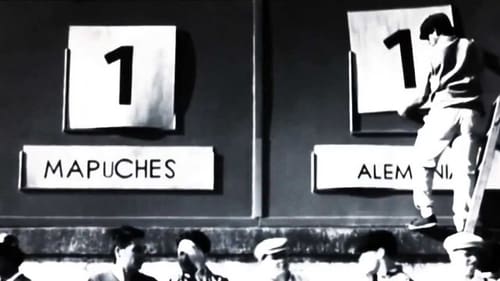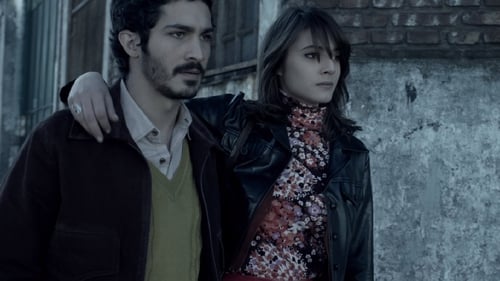
The youngsters housed in the "Almafuerte" Maximum Security Juvenile Institute have their first approach to audiovisual recording. A film and documentary video workshop serves as an excuse for them to make a short film inside the prison. The camera is a rabid toy that generates fascination in them and rescues a sheltered, innocent smile that seemed forgotten under the shadows. While inside libertarian cries bounce against the walls, outside sounds fanfares of an iron fist.

A fragmented biography, inconclusive, partial, of the brilliant Argentinian writer Jorge Luis Borges, based on different testimonies: his links with Leonor de Acedevo —his mother— and María Kodama —his second wife—; his vast culture and devout dedication to literature, his and that of others; his country: the politicians and the disloyal military. Borges gradually builds his own impersonation of Borges.

The film reconstructs the mysterious story of the 1942 Patagonia World Soccer championship, never acknowledged by the official sports organizations, and which for decades have remained shrouded in legend without the winner ever being known.

"The Disappeared" relives the horrors of Argentina's Dirty War (1976-83) through the experience of Horacio Pietragalla, a young man raised by the maid of the officer who kidnapped him after the military brutally murdered his parents. The film follows Horacio as he reconstructs the cause for which his real parents gave their lives, and, through this search, reclaims his true identity. This personal journey internalizes the tragedy that ravaged the country for seven years and exposes polarized views on state-driven terrorism in groundbreaking interviews with top military officials, concentration camp victims, human rights activists, journalists who covered the events, and members of Horacio's surrogate and biological families.

Hard things were said. Incredible things were said. It is time to think about everything that was said. An account of Kirchnerism, a left-wing populist movement that ruled Argentina from 2003 to 2015, led by Néstor Kirchner (1950-2010) and his wife Cristina Fernández de Kirchner.

Anecdotes and testimonials about the performance of Argentina in the 1986 FIFA World Cup. The whole story behind the Cup.

Through testimonies and images, the crude reality of human rights in Argentina in democracy is portrayed and the role of the hegemonic means of communication to make causes and protests invisible ...

In the present, in Spain, Miguel's mind, affected by a brain disease, seems cloistered in the past, in Argentina, in the seventies, when he risked his life for his ideals. He is obsessed with finding a woman named Diana. Mario, his son, who has been away from Miguel for a long time, now feels compelled to unravel the mystery of a name that, like a curse, pursues his father.

Argentina, as hosts in 1978, were under great pressure to succeed. Amidst passionate supporters, they progressed to the finals with a wonderful blend of attacking football and tough defending. The unlucky Dutch, now lacking Cruyffs' sublime skills, were the fall guys once again in the Final, losing 3-1 in a classic clash of styles. This 1991 reedited version omits controversial interviews from the 1978 original "Copa 78 - O Poder do Futebol", while also including additional television footage of the tournament and newly dubbed English narration instead of the original Spanish.

インディオに布教するため、南米奥地へとやって来たイエズス会の神父ガブリエル。だが、ポルトガル政府もその地を狙っていた……。出演はロバート・デ・ニーロ、ジェレミー・アイアンズら。

Joan Manuel Serrat fled to Mexico when Franco ordered his persecution. In Argentina and Chile, his commitment against military regimes is still remembered. Joaquín Sabina arrived later. His poetry bewitched the audience. In Argentina, he is a tango singer as much as a rocker; in Mexico, the mariachis sing their songs. The former is a symbol, a venerated figure; the latter is a “cuate,” as they say in Mexico, a buddy with whom you can always count.

Presenter Nigel Marven walks alongside the biggest dinosaurs that ever lived, providing a sense of perspective as he journeys through the Land of Giants.

Juan lives a solitary existence on a remote farm ever since he witnessed a UFO event. Filmmaker Alan Stivelman -together with the help of famous astrophysicist Jacques Vallée- begin an epic journey to help Juan in understanding the deep meaning of his close encounter. This true story shows the long-term consequences of close encounters, proving that no one is exempt from a potential contact.

Images of Argentinian companies and factories in the first light of day, seen from the inside of a car, while the director reads out documents in voiceover that reveals the collusion of the same concerns in the military dictatorship’s terror.

In this documentary about the exile of two famous French actors in Argentina during and after World War II, the director Cozarinsky returns to Argentina after many years in France and recalls places and events from his childhood, particularly the celebration of the liberation of Paris on in August of 1944, in Buenos Aires's Plaza Francia. Featuring testimony from various authors and acquaintances of Maria (Renee) Falconetti and Robert Le Vigan, the film explores their lives and final years in Argentina.

The life and work of Argentinian writer Jorge Luis Borges, a long interview, fragments of some of his most significant verses and dramatizations of some of his stories. Borges for everyone.













